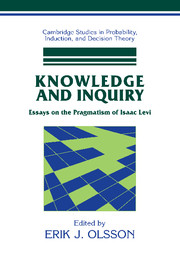Book contents
- Frontmatter
- Contents
- List of Contributors
- Preface
- Introduction: The Pragmatism of Isaac Levi
- 1 Isaac Levi and His Pragmatist Lineage
- 2 Is Pragmatist Truth Irrelevant to Inquiry?
- 3 The Knowledge Business
- 4 Infallibility and Incorrigibility
- 5 Why Inconsistency Is Not Hell: Making Room for Inconsistency in Science
- 6 Levi on Risk
- 7 Vexed Convexity
- 8 Levi's Chances
- 9 Isaac Levi's Potentially Surprising Epistemological Picture
- 10 Isaac Levi on Abduction
- 11 Potential Answers – To What Question?
- 12 Levi and the Lottery
- 13 The Value of Truth and the Value of Information: On Isaac Levi's Epistemology
- 14 Decision-Theoretic Contraction and Sequential Change
- 15 Deciding What You Know
- 16 Levi's Ideals
- 17 The Mind We do Not Change
- 18 Psychoanalysis as Technology
- 19 Levi on Money Pumps and Diachronic Dutch Books
- 20 Levi on the Reality of Dispositions
- 21 Replies
- Index
- References
14 - Decision-Theoretic Contraction and Sequential Change
Published online by Cambridge University Press: 05 March 2010
- Frontmatter
- Contents
- List of Contributors
- Preface
- Introduction: The Pragmatism of Isaac Levi
- 1 Isaac Levi and His Pragmatist Lineage
- 2 Is Pragmatist Truth Irrelevant to Inquiry?
- 3 The Knowledge Business
- 4 Infallibility and Incorrigibility
- 5 Why Inconsistency Is Not Hell: Making Room for Inconsistency in Science
- 6 Levi on Risk
- 7 Vexed Convexity
- 8 Levi's Chances
- 9 Isaac Levi's Potentially Surprising Epistemological Picture
- 10 Isaac Levi on Abduction
- 11 Potential Answers – To What Question?
- 12 Levi and the Lottery
- 13 The Value of Truth and the Value of Information: On Isaac Levi's Epistemology
- 14 Decision-Theoretic Contraction and Sequential Change
- 15 Deciding What You Know
- 16 Levi's Ideals
- 17 The Mind We do Not Change
- 18 Psychoanalysis as Technology
- 19 Levi on Money Pumps and Diachronic Dutch Books
- 20 Levi on the Reality of Dispositions
- 21 Replies
- Index
- References
Summary
For almost half a century Isaac Levi has perfected the details of a comprehensive epistemology deeply rooted in the epistemic voluntarism of the three great American pragmatist philosophers (J. Dewey, C. S. Peirce, and W. James). Beliefs in his view “are not impressions or dispositions to assent or other behavior, they are commitments” (Levi 1991, p. 74). Levi would argue that rational agents are able to choose how to revise these doxastic commitments and that, in this sense, agents can deliberately change their beliefs. So, rational agents can choose what to believe. Not always, of course. Perception, for example, would be in Levi's view a case of routine expansion where the inquirer expands his or her view in accordance with a precompiled program for adding new information. But forming a belief via one of these routines involves in Levi's view forming a commitment just as much as when the inquirer deliberately chooses to be committed.
Levi's pioneering work on belief revision was first presented in his important book The Enterprise of Knowledge (Levi 1980), building on work on induction first presented in 1967. The mid- and late 1980s witnessed the beginning of a multidisciplinary discussion on the nature of belief change inaugurated by the publication (in 1985) of an influential paper by Carlos Alchourrón, Peter Gärdenfors, and David Makinson. The AGM trio was of course aware of Levi's work but they tackled the problem of belief change under a very different point of view.
- Type
- Chapter
- Information
- Knowledge and InquiryEssays on the Pragmatism of Isaac Levi, pp. 201 - 224Publisher: Cambridge University PressPrint publication year: 2006

